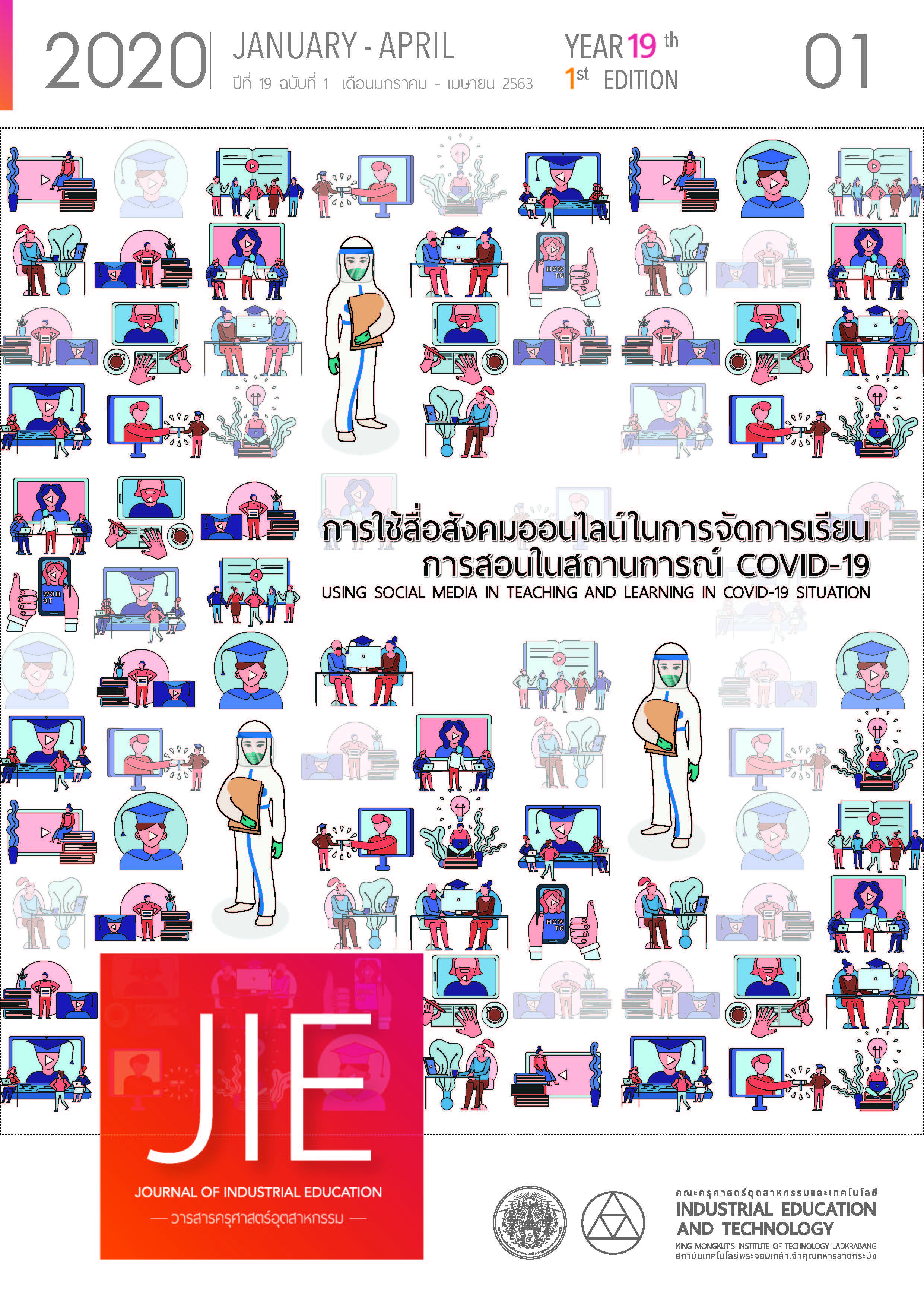USING SOCIAL MEDIA IN TEACHING AND LEARNING IN COVID-19 SITUATION
Abstract
จากการที่กระทรวงการอุดมศึกษา วิทยาศาสตร์ วิจัยและนวัตกรรมได้ประกาศเรื่องมาตรการและการเฝ้าระวังการระบาดของโรคไวรัสโคโรนาสายพันธุ์ใหม่ 2019 (COVID-19) โดยให้หยุดดำเนินการเรียนการสอนทุกรูปแบบยกเว้นการสอนแบบออนไลน์ [1] ทำให้ผู้สอนและผู้เรียนต่างตื่นตัวกับการสอนแบบออนไลน์เป็นอย่างมาก ซึ่งการสอนแบบออนไลน์เป็นการสอนผ่านทางอินเทอร์เน็ตโดยไม่จำเป็นต้องเดินทางมาพบกัน สามารถสอนได้ทุกที่ ทุกเวลา ข้อความ รูปภาพ เสียง วิดีโอ และ มัลติมีเดียอื่น ๆ จะถูกส่งไปยังผู้เรียนผ่าน Web Browser ผู้เรียนทุกคนในชั้นเรียน ผู้สอน สามารถติดต่อสื่อสาร แลกเปลี่ยนความคิดเห็นได้ อย่างไรก็ตามผู้เรียนจำเป็นต้องมีความรับผิดชอบในการเรียนมากกว่าปกติ เพราะไม่มีใครสามารถที่จะควบคุมดูแลผู้เรียนได้อย่างใกล้ชิด แอปพลิเคชันที่นิยมใช้ในการสอนออนไลน์ในปัจจุบัน เช่น OBS Skype Zoom Google classroom Google meeting Microsoft team Facebook Line เป็นต้น ในบรรดาแอปพลิเคชันทั้งหมดที่กล่าวมา แอปพลิเคชันที่คนรุ่นใหม่มักจะใช่ในชีวิตประจำวันสูงสุด คือ Facebook ร้อยละ 36 Line ร้อยละ 31 และแอปพลิเคชันสื่อสังคมออนไลน์ที่คนรุ่นใหม่ใช้ในชีวิตประจำวันสูงสุด คือ Facebook ร้อยละ 98 Youtube ร้อยละ 82 [2] จากข้อมูลนี้การใช้แอปพลิเคชันสื่อสังคมออนไลน์น่าจะเป็นช่องทางที่สะดวกและรวดเร็วในการเข้าถึงผู้เรียนมากที่สุดในการสอนออนไลน์
บทความปริทัศน์ที่ผู้เขียนนำมาเสนอนี้เป็นการรวบรวมบทความจากวารสารต่าง ๆ ที่เกี่ยวข้องกับการใช้สื่อสังคมออนไลน์ในการจัดการเรียนการสอนโดยผู้เขียนได้มีการรวบรวมเอกสาร 2 ประเด็น ได้แก่ 1) ประเด็นพฤติกรรมและแนวทางในการใช้สื่อสังคมออนไลน์ 2) การจัดการเรียนการสอนโดยใช้สื่อสังคมออนไลน์ เพื่อให้ผู้อ่านได้มองเห็นภาพหลักการและผลการวิจัยต่าง ๆ อันจะนำไปสู่แนวคิดในการใช้แอปพลิเคชันสื่อสังคมออนไลน์ที่สามารถนำไปปรับใช้ในการจัดการเรียนการสอนออนไลน์ในสถานการณ์ COVID-19 ต่อไป
References
Ministry of Higher Education, Science, Research and Innovation. 2020. Announcement of the Ministry of Higher Education, Science, Research and Innovation on Measures and Surveillance of the Corona Virus Outbreak 2019. Retrieved from April 9, 2020 from https://www.vet.cmu.ac.th/web/file/COVID-19/1/covid-3.pdf
K. Boonyen. 2019. Top 7 applications that new generations use in daily life. Retrieved from April 9, 2020 from https://www.bizpromptinfo.com
Suwimon Vongsingthong. 2016. Information Dissemination Behavior in Online Social Networks of Teenagers. Romphruek Journal, 34(2) : p.12-32.
Phornphan Jandaeng. 2016. Social Network Using Behavior of Undergraduate Students of University of Phayao. Journal of Humanities and Social Sciences University of Phayao, 4(2) : p.44-54.
Amornrat Wongsopa, Sakesan Saiseesod, and Nangnoy Yanwaree. 2015. The Usage Behavior on Facebook Social Media Online and Their Effects on Students’ Life Style: A Case Study of Loei Rajabhat University. Research and Development Journal Loei Rajabhat University,10(33) : p.1-10.
Apatcha Changkwanyuen. 2018. Behavior use Social Media and Social Media Literacy Skills of Undergraduate Students Naresuan University. Journal of Education Silpakorn University,16(1) : p.188-197.
Krodshagorn Boonyapitruksagoon Pitchayanee Poonpol.2019. Factors Related to Using Social Media Behavior and Media Literacy in Universities in Bangkok Metropolitan Area. Warasarn Phuettikammasat, 25(2) : p.40-59.
Sarisa Jantaraumporn and Marid Kaewchinda. 2016. Current Situation and Enhancement of Social Media Online Literacy among Adolescents. Journal of Graduate Studies Valaya Alongkorn Rajabhat University, 10(1) : p.83-93.
Patcharapa Euamornvanich. 2018. Media Literacy in Social Media. The Golden Teak : Humanity and Social Science Journal, 24(Special) : p.22-30.
Chatmuang Phaomanacharoen, Chatupol Yongsorn and Chakrit Ponathong. 2018. A Factor Analysis of Social Media Literacy of Undergraduates in Autonomous Higher Education Institutions in Bangkok. The journal of Social Communication Innovation, 6(2) : p.8-21.
Usanee Kangwanjit . 2016. Children and The Youth’s Social Media Literacy. The National Defence College of Thailand Journal, 58(3) : p.79-92.
Nithida Wiwatpanitch. 2015. Development of Social Media Literacy Skills. Journal of Graduate Studies Valaya Alongkorn Rajabhat University, 9(3) : p.209-219.
Pundita Intharaksa. 2019. Learning Management with Social Mrdia. Journal of Education Naresuan University, 21(4) : p.357-365.
Eknarin Bangthamai. 2015. The Study Current Situations of Teaching and Learning to Enhance the Ceativity in Use of the Internet for University Student. Veridian E-Journal,Silpakorn University (Humanities, Social Sciences and arts, 8(2) : p.1241-1259.
Anchalee Suknaisith. 2016. The Results of Instruction in Research Method of Social Sciences Using Social Media. Humanities and Social Sciences. Journal of Graduate School, Pibulsongkram Rajabhat University, 10(2) : p.138-154.
Siwanit Autthawuttikul. 2020. Effects of Learning Activities Based on Coaching and Mentoring Techniques via Social Media to Enhance Training Management Abilities of Undergraduated Students Department of Educational Technology, Faculty of Education, Silpakorn University. Silpakorn University Journal, 40(2) : p.62-77.
Sumalee Chuachai. 2018. Using Social Media in Blended Learning. Journal of Industrial Education, 7(3) : p.214-221.
Teppayapong Seskuembong. 2012. Effect of e-Learning Using Collaborative Learning via Social Media on Competency of Using Information and Communication Technology of Undergraduate Educational Students. Veridian E-Journal,Silpakorn University (Humanities, Social Sciences and arts), 5(2) : p. 569-584.
Pipat Auttaput,Tipparat Sittiwong, and Direk Teeraputon. 2017. The Effects of Using Social Network and Active Learning in the Design and Production of Computer Graphics Course for Undergraduate Students. Journal of Education Naresuan University, 19(2) : p.145-154.
Downloads
Published
How to Cite
Issue
Section
License
"The opinions and contents including the words in papers are responsibility by the authors."
"ข้อคิดเห็น เนื้อหา รวมทั้งการใช้ภาษาในบทความถือเป็นความรับผิดชอบของผู้เขียน"



